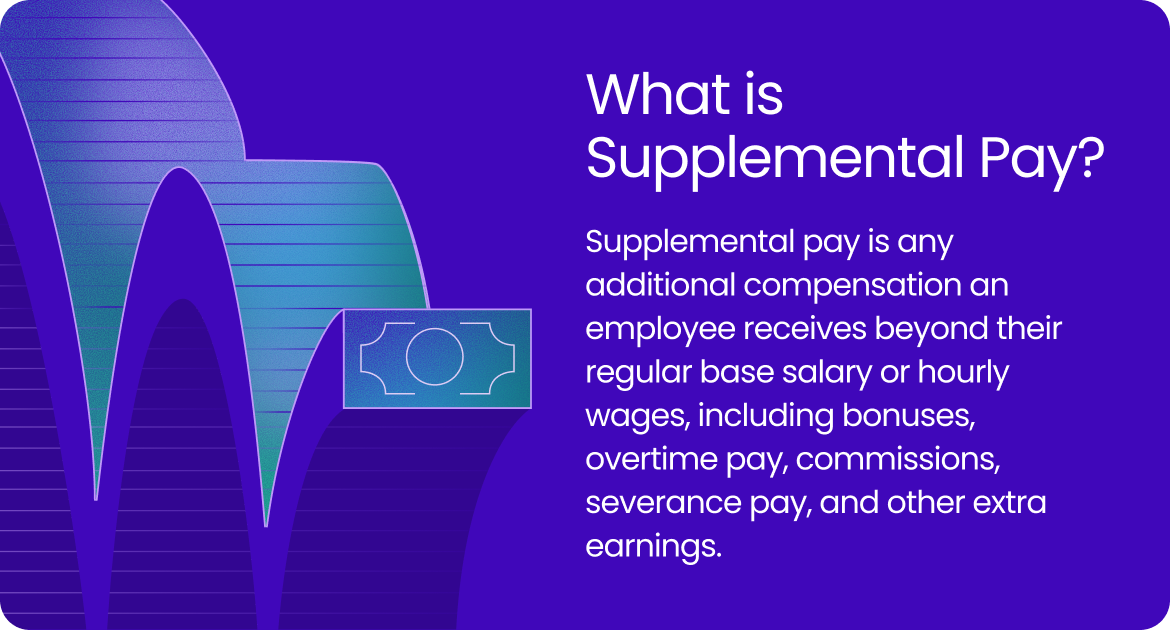Supplemental pay, also known as supplemental wages or additional income, is any compensation beyond an employee’s regular salary or hourly wages. It’s typically tied to specific achievements, like hitting sales targets, or circumstances, like working extra hours. For HR managers, it’s a flexible way to incentivize performance and meet diverse employee needs across global markets.

Why is Supplemental Pay Important?
In 2025, with global salary increases set to rise by an all time high of 3.9%, supplemental pay is your secret weapon to stand out in a competitive hiring market, while still accounting for economic uncertainty and the increasing price of labor.
Managing it on a global scale, however, is no walk in the park. Tax laws, labor regulations, and cultural expectations vary significantly between countries. What’s considered an acceptable bonus in one region could raise eyebrows in another. And, let’s not forget the need to ensure compliance with local tax rules and labor laws, which can be complicated and time-consuming to navigate.
The key to leveraging supplemental pay effectively lies in understanding these complexities, staying informed on regulations, and customizing your approach to meet both business needs and local standards. When done right, supplemental pay not only boosts employee satisfaction but also strengthens your global brand as an employer of choice.
Types of Supplemental Pay
Supplemental pay comes in various forms, each serving a unique purpose in your compensation strategy. Here’s a quick and simple breakdown of each type:
What Doesn’t Qualify as Supplemental Pay?
Not all extra payments count as supplemental pay. Here’s what’s typically excluded:
- Regular Wages: Base salary or hourly pay for standard duties.
- Paid Time Off (PTO): Considered part of regular compensation.
- Stipends: Fixed amounts for expenses like travel or meals.
- Non-Taxable Fringe Benefits: Perks like health insurance or tuition assistance (within IRS limits).
- Equity Compensation: Stock options or restricted stock units, taxed differently.
For example, a $500 travel stipend isn’t supplemental pay, it’s technically classified as a reimbursement. But a $500 payout for unused vacation days might qualify.
How is Supplemental Pay Taxed?
Taxation of supplemental pay varies by country. Below, we provide a U.S. breakdown, with global notes:
U.S. Taxation
- Paid Separately: Supplemental pay in a separate check is taxed at a flat 22% federal income tax for amounts up to $1 million. Over $1 million in a year? It’s 37%.
- Combined with Regular Pay: If lumped with regular wages, it’s taxed based on the employee’s W-4 withholding rate.
- Other Taxes: Subject to Social Security (6.2%), Medicare (1.45%), and federal unemployment taxes (FUTA). State and local taxes may apply, varying by jurisdiction.
Global Taxation Examples
- Mexico: Bonuses like “aguinaldo” (a mandatory 13th-month payment) are taxed at progressive income tax rates, up to 35% (Mexico Labor Laws, 2025).
- Germany: Bonuses are subject to income tax and social security contributions, with rates up to 45% for high earners (German Tax Office, 2025).
- Singapore: Bonuses are taxed at standard income tax rates, but employers must report them separately (IRAS, 2025).
For example, a $5,000 bonus paid separately in the U.S. has $1,100 (22%) withheld for federal taxes, plus Social Security and Medicare. In Mexico, the same bonus might face a progressive tax rate based on the employee’s income bracket.
Why Supplemental Pay Matters for HR Managers
Supplemental pay is becoming a key part of how HR managers and global employers think about compensation.
Here’s why it’s so important:
- Attracts Top Talent: Offering bonuses, commissions, or other types of supplemental pay can make your job offers stand out in a crowded market. It’s a great way to appeal to skilled professionals who are looking for more than just a salary.
- Drives Performance: Employees love when their hard work is rewarded. Bonuses and commissions help keep motivation high and encourage people to hit their goals, ultimately driving productivity and pushing your business forward.
- Offers Flexibility: Supplemental pay gives you the flexibility to reward employees without committing to permanent salary increases. It allows you to adjust your compensation strategy as needed, which is super helpful in today’s ever-changing work environment.
- Ensures Compliance: Keeping track of different tax and labor laws across countries can be tricky. But when managed correctly, supplemental pay helps ensure you’re staying compliant with the various regulations, keeping legal risks at bay.
- Boosts Retention: Employees want to be paid fairly. By offering supplemental pay, you can address their desire for higher compensation, helping to keep your top performers happy and turnover down.
Best Practices for Managing Supplemental Pay Globally
To make supplemental pay work for your organization, follow these best practices:
- Communicate Clearly: Outline eligibility and criteria for supplemental pay in employee contracts and handbooks. Transparency builds trust.
- Ensure Fairness: Apply consistent policies across teams and regions to avoid perceptions of favoritism.
- Stay Compliant: Monitor federal, state, and international tax laws to avoid penalties. For example, ensure compliance with Mexico’s mandatory severance pay or Germany’s social security contributions.
- Track Accurately: Use quality payroll software to maintain detailed records for tax reporting and audits.
- Align with Strategy: Tie supplemental pay to business goals, like retention in high-turnover industries or performance in sales-driven roles.
- Leverage Technology: Use tools like Playroll’s HR solutions platform to automate payroll and compliance across countries.
Supplemental Pay Around the World
Supplemental pay practices vary significantly by region, impacting your global compensation strategy. Here’s a snapshot:
Playroll’s EOR and HR solutions make managing supplemental pay across borders simple and compliant, so you can focus on building your global team.
Get Started
.svg)
.svg)
.svg)
.svg)
.svg)





.svg)



.png)


.png)

.svg)



















.svg)